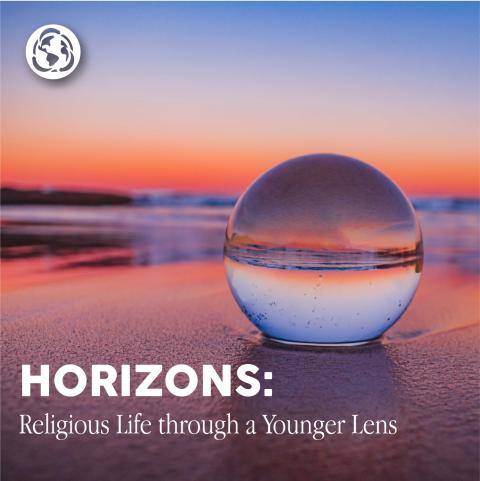
(Unsplash/Greg Rosenke)

In my personal journey one of the most fulfilling experiences is to be accompanied. To tell the truth, it has not always been easy for me to open my vulnerability to another person, or even to myself. I believe an essential part of accompaniment is being able to touch my most intimate spaces, the ones I'm sometimes afraid to see or recognize.
At the same time, it's this experience of being accompanied that has allowed me to learn to be sensitive to God's presence in my daily life. The subtlety of the breeze in which God sustains my life is where I am faced with small and big decisions in this journey of becoming a sister.
Sometimes, in the midst of my mess, the accompaniment helps me to see a small light announcing resurrection.
Being a spiritual companion has been for me a deep and conscientious experience of sharing a sacred space. I must say that I have mostly accompanied women and survivors of different kinds of traumatic experiences.
I'm aware that this ministry of spiritual accompaniment represents a specific calling within my vocation as a religious, particularly as a Franciscan Missionary of Mary. Through my personal experience of consecration, and discernment of God's presence in my life, I know that part of my personal calling as a sister means to be able to sit and listen to my sisters and brothers with all my heart, bearing witness to God's mystery in each one.
I recognize that every time I begin a new accompaniment, I need to bare my feet (Exodus 3:5), deeply knowing that I'm privileged to enter the sacred space of my sister or my brother. I'm aware that I'm only a humble witness to what God is doing and journeying with the person.
In this sense, because spiritual accompaniment is always an encounter, and in my experience, often between two women, I want to risk reflecting on an icon that can symbolize this ministry for me. According to Serena Jones in her book Trauma and Grace: Theology in a Ruptured World, the relationship between Elizabeth and Mary of Nazareth provides a powerful symbol. We really don't know what happened between them, how they experienced the mystery of Jesus, or how they received all these events. We can only guess.
This beautiful relationship between two women — Elizabeth the elder cousin, with more experience, with a life full of joys and sorrows, with the pain of not being able to give birth, and with a deep faith which has allowed her to receive a new life from God — and Mary, a young girl, full of life and hope, with an overwhelming experience that she can't even begin to understand, only knowing that her life just changed completely (Luke 1:39-56).
Both have something to offer each other, and in their journey, God gives them the possibility to begin to understand the mystery in their lives.
Maybe Elizabeth has taken the time to try to read her life in God's light, and God's mercy gives her the possibility to be a mother, to hold in her womb the life of a prophet, bringing together all her history and having a humble part in the history of salvation. On the other hand, Mary comes, full of life, after an astounding experience of God, not entirely understanding what just happened and trying to guess how her response is going to touch her life.
In my short experience, I'm beginning to understand that the person seeking accompaniment is full of life, and experiences both difficult and beautiful. She is only trying to respond to God in truth and with her whole being, seeking to give meaning to her experiences of pain and brokenness. She's trying to understand the impossible things God is doing in her life (Luke 1:37), and she takes the risk of opening her own vulnerability, trusting God through the presence of the spiritual companion.
Advertisement
This is the most sacred moment: when Elizabeth understands that Mary has been seen and visited by God. Her silence becomes the best response, as in the presence of such a mystery, she can only allow Mary to sing her Magnificat and respectfully join this beautiful thanksgiving.
In the same way, I can humbly say I'm a witness to God's mystery in every person I accompany, both past and present. The healing presence of God in the space of spiritual accompaniment touches and heals us both in different and unique ways.
According to Shelly Rambo in her book, Spirit and Trauma: A Theology of Remaining (2010), sometimes, spiritual accompaniment is a space that also allows sharing traumatic experiences, and it becomes a sacred and liminal space. This is where God's grace breaks, giving us the possibility of recognizing Jesus' presence, a new presence, according to Jones.
In 2024 at the International Congress on Spiritual Accompaniment and Conversation Jesuit Fr. Javier Melloni noted that when a person is able to share her most painful experiences and feels listened to, and welcomed in a secure space, she can feel the soft touch of God. This comfort helps give meaning to her experience, helping her to see the pain, to heal her heart, to forgive others and herself.
I'm truly aware that this ministry of spiritual accompaniment is a gift from God, a deep experience of contemplating who God is in every person. There are moments when it becomes a joyful encounter, full of dreams and happiness, and there are other moments where it becomes a space for sharing death, pain and ruptures.
In recognizing this miracle, I understand that I'm able to accompany my sister or brother only through my own death, pain and ruptures, my experience of trauma that God has taken, healed and transformed in a new resurrection, but also from my moments of joy and feeling loved. It's there where I have experienced God's unconditional love, which I can only allow to flow through my body and soul to reach the person I'm accompanying.
Maybe, through the ministry of spiritual accompaniment, God is also allowing me to babble my own Magnificat that brings all the faces, names, histories, and miracles of the women God has given to my heart through this beautiful sacramental and liminal space.







